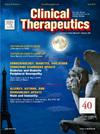The Effect of Dexmedetomidine on Inflammatory Factors and Clinical Outcomes in Patients With Septic Shock: A Randomized Clinical Trial
IF 3.2
4区 医学
Q2 PHARMACOLOGY & PHARMACY
引用次数: 0
Abstract
Purpose
Dexmedetomidine is a sedative-analgesic that is widely used in sepsis. However, its effect on septic shock remains unclear. This study aimed to investigate dexmedetomidine's effect on inflammatory biomarkers in septic shock.
Methods
The present study was a randomized controlled clinical trial. Patients with inclusion criteria were randomly allocated into either the dexmedetomidine (n = 24) or morphine + midazolam group (n = 24). The primary outcome was changes in inflammatory factors, including IL-1, IL-6, TNF-α, ESR, and CRP. The serum levels of inflammatory factors were measured at baseline and the end of the intervention. Secondary outcomes included the change in norepinephrine dose, vital signs, and SOFA scores.
Findings
Of the 48 subjects, 52.08% were male. After intervention, IL-1, IL-6, and TNF-α levels significantly differed between the 2 groups (p = 0.011 and p < 0.001 and p < 0.001, respectively). Heart rate and systolic blood pressure decreased over time, but the two groups had no significant difference (p-value > 0.05). In addition, there was no significant difference in norepinephrine dose and SOFA score between the 2 groups (p-value > 0.05).
Implications
Sedation with dexmedetomidine can attenuate the inflammatory factors in septic shock. Also, dexmedetomidine did not worsen the hemodynamic parameters in septic shock patients.
右美托咪定对感染性休克患者炎症因子和临床结局的影响:一项随机临床试验。
目的:右美托咪定是一种广泛用于脓毒症的镇静镇痛药。然而,其对感染性休克的影响尚不清楚。本研究旨在探讨右美托咪定对感染性休克中炎症生物标志物的影响。方法:本研究为随机对照临床试验。符合入选标准的患者随机分为右美托咪定组(n = 24)和吗啡+咪达唑仑组(n = 24)。主要结局是炎症因子的变化,包括IL-1、IL-6、TNF-α、ESR和CRP。在基线和干预结束时测量血清炎症因子水平。次要结局包括去甲肾上腺素剂量、生命体征和SOFA评分的变化。结果:48例患者中,男性占52.08%。干预后,两组患者IL-1、IL-6、TNF-α水平差异有统计学意义(p = 0.011, p < 0.001, p < 0.001)。心率和收缩压随时间降低,但两组差异无统计学意义(p值> 0.05)。两组间去甲肾上腺素剂量、SOFA评分差异无统计学意义(p值bb0 0.05)。意义:右美托咪定镇静可减轻感染性休克的炎症因子。此外,右美托咪定没有恶化脓毒性休克患者的血流动力学参数。
本文章由计算机程序翻译,如有差异,请以英文原文为准。
求助全文
约1分钟内获得全文
求助全文
来源期刊

Clinical therapeutics
医学-药学
CiteScore
6.00
自引率
3.10%
发文量
154
审稿时长
9 weeks
期刊介绍:
Clinical Therapeutics provides peer-reviewed, rapid publication of recent developments in drug and other therapies as well as in diagnostics, pharmacoeconomics, health policy, treatment outcomes, and innovations in drug and biologics research. In addition Clinical Therapeutics features updates on specific topics collated by expert Topic Editors. Clinical Therapeutics is read by a large international audience of scientists and clinicians in a variety of research, academic, and clinical practice settings. Articles are indexed by all major biomedical abstracting databases.
 求助内容:
求助内容: 应助结果提醒方式:
应助结果提醒方式:


